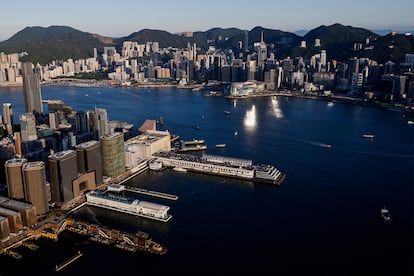The world’s most expensive cities to live in: Hong Kong, Singapore and Zurich lead the list
The rapid rise in the cost of living in African cities is another striking feature of this year’s ranking by the consulting group Mercer

In times of runaway inflation and the rise of teleworking, the cost of living has become a key factor for residents seeking to maintain their standard of living, and for those who are free to work wherever they like. According to a new study by the consulting group Mercer, Hong Kong, Singapore and Zurich top the ranking of the most expensive cities.
After the debacle of Credit Suisse, one of the symbols of Switzerland’s banking system, times are difficult for Swiss self-esteem, but its reputation for being one of the places preferred by big capital, and its high salaries, are also reflected in prices: four of the five most expensive European cities on the global Top Ten are in Switzerland: Zurich (third), Geneva (fourth), Basel (fifth) and Bern (seventh). The Danish capital, Copenhagen, completes the European quintet. Other expensive cities in Europe include London, Vienna, Amsterdam, Prague and Helsinki. In Spain, Barcelona ranks 75th and Madrid is in 83rd spot.
“Competition in the global talent market is fierce, and the cost-of-living crisis affects both employees and businesses, who need to be more flexible,” says Yvonne Traber, Global Managing Partner of Mobility at Mercer. The consultant acknowledges, however, that prices are not the only thing that influences the attractiveness of cities seeking to draw new companies and workers. “An equally important factor is the general quality of life that a city offers. Conversely, risks and other negative issues, such as natural disasters, political or economic turmoil, high crime rates, poor infrastructure, and inadequate international connectivity can be major deterrents for businesses and their employees.”
Among those gaining the most positions is Singapore, one of the most important business centers in the world, with a significant presence of multinationals in sectors such as finance, logistics, trade and transportation, which rose six positions on the list to second place. Singapore has been forced to promote policies to cushion the rise in housing prices due to the influx of expatriates, including a series of discounts for local residents who want to buy a house. Nassau, in the Bahamas, and Los Angeles, in California, also climbed six positions to 10th and 11th place. The latter is the second most expensive city in the U.S., only behind New York (sixth overall), and closely followed by San Francisco (13th).
Tel Aviv remains the most expensive city in the Middle East, ranked 8th on the global ranking. Dubai (18th) and Abu Dhabi (43rd), both in the United Arab Emirates, and Riyadh (85th) and Jeddah (101st) in Saudi Arabia all moved up the list.
The rapid rise in the cost of living in African cities is another striking feature of this year’s list. Luanda, the capital of Angola, jumped up 34 positions and is now 30th globally; Kinshasha, capital of the Democratic Republic of Congo, moved up 21 positions to 32nd place; Conakry went up 37 places on the global list and is now ranked 39, while N’Djamena (the capital of Chad) is 40th after moving up 40 positions. But it was cities in Latin America that jumped up the most on the global ranking: San José (Costa Rica) moved up 76 spots, Mexico City rose by 70 places, and Buenos Aires and Montevideo tied at 69. At the other end of the spectrum, those that dropped the most places were Havana (83), Cairo (63) and Osaka (56). Karachi and Islamabad, both in Pakistan, are at the very bottom of the ranking.
Sign up for our weekly newsletter to get more English-language news coverage from EL PAÍS USA Edition
Tu suscripción se está usando en otro dispositivo
¿Quieres añadir otro usuario a tu suscripción?
Si continúas leyendo en este dispositivo, no se podrá leer en el otro.
FlechaTu suscripción se está usando en otro dispositivo y solo puedes acceder a EL PAÍS desde un dispositivo a la vez.
Si quieres compartir tu cuenta, cambia tu suscripción a la modalidad Premium, así podrás añadir otro usuario. Cada uno accederá con su propia cuenta de email, lo que os permitirá personalizar vuestra experiencia en EL PAÍS.
¿Tienes una suscripción de empresa? Accede aquí para contratar más cuentas.
En el caso de no saber quién está usando tu cuenta, te recomendamos cambiar tu contraseña aquí.
Si decides continuar compartiendo tu cuenta, este mensaje se mostrará en tu dispositivo y en el de la otra persona que está usando tu cuenta de forma indefinida, afectando a tu experiencia de lectura. Puedes consultar aquí los términos y condiciones de la suscripción digital.









































